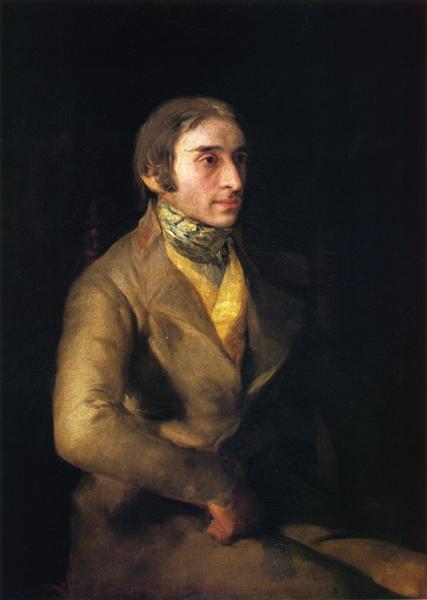Popis
Práce „Maunel Silvela - 1812“ od Francisco Goya, je portrét, který zapouzdřuje podstatu romantismu a klasicismu, který charakterizoval produkci mistr Aragonese. Na tomto plátně Goya dosahuje syntézu mezi věrným zastoupením a osobním výkladem, což umožňuje divákovi přistupovat k osobnosti jeho předmětu, Manuela Silvela, vynikajícího politika a kulturní postavy té doby. Silvelova reprezentace je studie charakteru a zmrazeného času v čase, směsí skvěle vyvážené intimity a formality.
Kompoziční přístup v tomto portrétu je pozoruhodný pro jeho frontalitu a pečlivou pozornost k detailům kostýmů, které se staly výrazným znakem Goyova malby. Silvela je oblečená v temné bundě a bílé kravatě, oblečení, které mu dává diskrétní důstojnost. Toto použití oblečení, které Goya maluje s téměř hmatatelným realismem, je hluboce významné, protože nejen odráží sociální postavení zobrazeného, ale také stanoví dialog o identitě a funkci jednotlivce ve společnosti jeho doby. Tmavé a homogenní pozadí se odehrává za Silvelou a vytváří kontrast, který zdůrazňuje jeho postavu a umožňuje divákovi soustředit se na jeho výraz a hloubku jeho pohledu.
Použití barvy je mistrovské. Goya používá paletu, která zůstává v tmavých a hrozných tónech, takže se zdá, že světlo vychází ze samotné Silvely a zdůrazňuje jeho rysy obličeje. To nejen poskytuje pocit tří dimenzionality, ale také evokuje melancholickou atmosféru, kterou lze interpretovat jako odraz emoční zatížení turbulentní politické éry, ve které Goya žila. Měkký přechod mezi stíny a světly tváří v tvář zobrazeným ukazuje technické mistrovství umělce ve správě Chiaroscuro, stylu, který během jeho práce prosazuje, a který je zde prezentován jako prostředek emocionálního vyjádření.
Goya se mu podaří předat život malbě, která přesahuje jednoduchou fyzickou reprezentaci. Silvelyho pohled je intenzivní a nabitý hlubokým pocitem introspekce; Lze jej interpretovat jako odraz ducha své doby, což je realita poznamenaná hlubokými politickými a sociálními změnami. Tento portrét se tak stává individuální reprezentací, ale symbolem turbulence, který definoval na začátku devatenáctého století ve Španělsku.
„Maunel Silvela - 1812“ je napsána v dlouhé tradici portrétů, ve kterých se Goya rozlišuje nejen jeho technickými schopnostmi, ale také kvůli jeho schopnosti zachytit lidskou podstatu. V tomto ohledu se jeho práce podobá práci současníků, jako je Édouard Manet, nebo dokonce zpět mistrů renesance jako Raffeello, který také ve svých dílech sloučil techniku a psychologii, ačkoli Goya tak činí z mnohem tmavší a hrubé perspektivy charakteristické pro jejich vlastní styl.
Jak divák uvažuje o této práci, odraz role umělce jako kronikáře jeho doby je nevyhnutelný. Francisco Goya, jehož život byl svědkem inkvizice, války a zklamání, se stává vizuálním tlumočníkem jeho reality. Tento portrét Manuela Silvely, i když zjevně osobní, má tento univerzální charakter, který zve širší reflexi lidského stavu v dobách agitace. Goya představuje Silvelu nejen jako jednotlivec, ale jako symbol, zcela reprezentativní pro éru plné vnitřních a vnějších konfliktů.
„Maunel Silvela - 1812“ tedy stojí nejen jako portrét politické historie evropského umění.
KUADROS ©, slavná barva na vaší zdi.
Ručně -vyráběné olejomalby s kvalitou profesionálních umělců a výraznou pečetí KUADROS ©.
Obrázky reprodukční služba se zárukou spokojenosti. Pokud nejste zcela spokojeni s replikou vašeho obrazu, vrátíme vaše peníze 100%.

